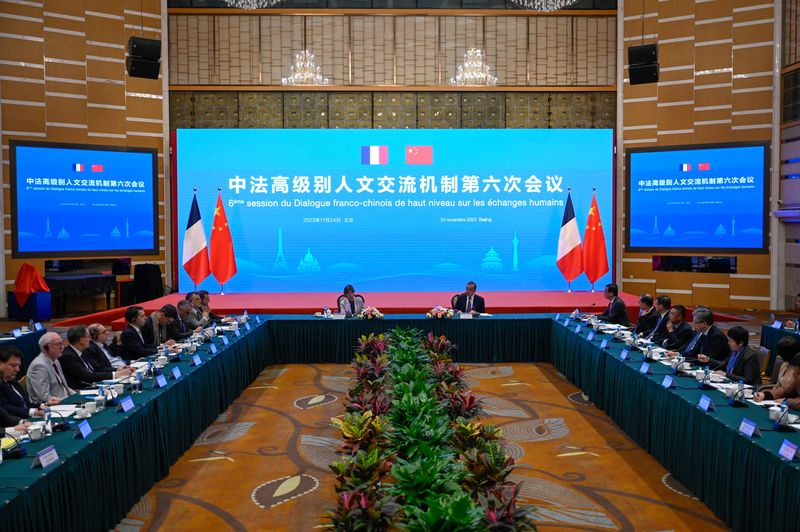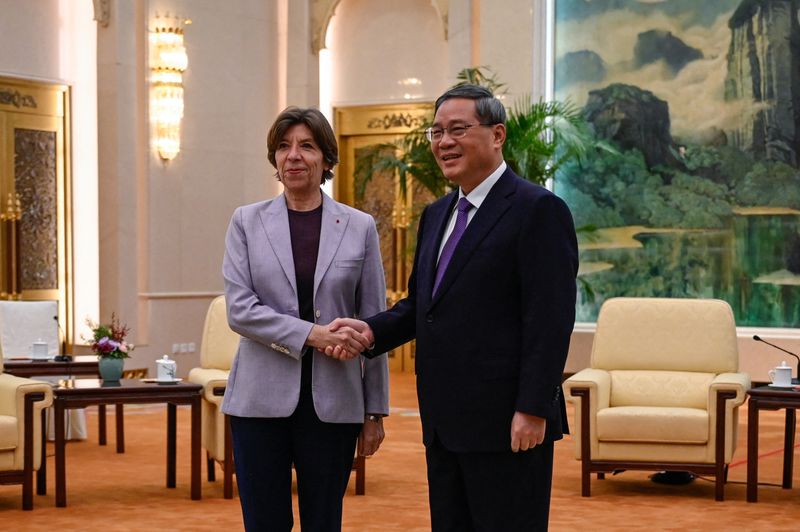By Laurie Chen and John Irish
BEIJING/PARIS (Reuters) -Europe should not be afraid of working with China because of competition, and the two sides should work together to enhance the reliability and stability of economic and trade relations, foreign minister Wang Yi said on Friday.
European officials have repeatedly vowed to reduce economic dependencies on China in critical sectors - otherwise known as "de-risking" - in the face of what the G7 calls China's "economic coercion".
"China's position is clear. We will adhere to our support of Europe's strategic autonomy," Wang said when asked about China's view of its relationship with Europe at a press briefing with his French counterpart in Beijing.
French Foreign Minister Catherine Colonna was visiting the Chinese capital, and earlier met Premier Li Qiang with whom she discussed a broad range of topics including rebalancing France's economic relationship with the world's second-largest economy.
Colonna said France was committed to dialogue with China, affirming ties after a European Union anti-subsidy probe backed by Paris into Chinese-made electric vehicles was blasted as "protectionist" by Beijing.
Her trip is centred on encouraging exchanges between citizens of both countries such as students and tourists, threatened to be overshadowed by the trade issues.
"We are really committed to dialogue with China," Colonna told Li, adding that she was "honoured" and happy to see him after their Paris meeting in June.
Wang said the differing demands of competition and cooperation need not clash.
"Of course there will be competition in cooperation, but we should not be afraid of cooperation because of competition. The biggest risk we need to get rid of is the uncertainty brought by broad politicisation," Wang said, adding that the dependency most in need of reduction is protectionism.
"At present, exchanges between China's business circles are resuming in an all-round way and heating up rapidly. We will listen to the voices of the European business community, earnestly solve the problems of investors in China," Wang said in the press briefing with his counterpart.
Both foreign ministers agreed to cooperate on a number of fronts.
"With China, we are working to find answers to global climate, biodiversity and debt challenges," Colonna wrote in a post on social media platform X.
Wang said he hopes to deepen exchanges with France in civil nuclear and aerospace, and explore emerging areas such as education and scientific research.
The Chinese premier, in his meeting with Colonna earlier, also took an upbeat stance on broader bilateral ties.
"Under the strategic leadership of President Xi Jinping and (French) President (Emmanuel) Macron, the relationship between China and France has been developing better and better in all aspects since this year," Li said.
"Next year will be the 60th anniversary of the establishment of diplomatic relations between China and France, and both of us are sustaining our efforts in the hope that the 60th year would see a big development and a big breakthrough."
CHINA-EU SUMMIT LOOMS
Colonna's trip precedes a visit by the European Commission and Council presidents, Ursula von der Leyen and Charles Michel, to Beijing in early December for the first in-person summit with President Xi Jinping in four years, after China-EU relations nosedived during the pandemic.
Macron, who met with Xi in China earlier this year, has argued the EU should stop being naive and demand a level playing field with countries like China, and had been pushing the European Commission behind the scenes to launch the probe.
China is France's third-largest trade partner, but French and other European firms are concerned about China's vast trade imbalance with the EU, its opaque legislation on cross-border data transfers and cheap Chinese EVs flooding the European market, threatening domestic carmakers.
France is also concerned about Chinese attempts to force French cosmetics companies to share manufacturing secrets with Chinese parties.

France is China's top source of cosmetics and wine imports, according to China's customs agency, with French luxury titans such as LMVH particularly dependent on Chinese consumers. The lack of a strong rebound in luxury demand following China's post-pandemic re-opening has spooked investors.
Xi insisted China welcomes investment from French firms in a telephone call on Monday with Macron, who urged fair treatment for foreign companies in China.
